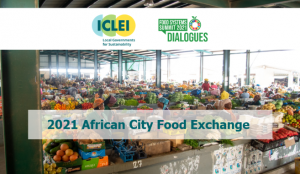Tipo de diálogo
Convocado por
Idioma del Diálogo
Fecha/hora
Para:
Ciudad
Enfoque geográfico
Formato
Por favor revise los detalles que encontrará más abajo para obtener información sobre cómo registrarse en el caso de que esté disponible o contacte al convocante si le gustaría asistir.
Administrador
Descripción
Today, about 50 percent of the world’s population lives in urban areas, a proportion that is expected to increase to 70 percent by 2050 – especially in Africa and Southeast Asia, where hunger and poverty are mostly concentrated. The rapid growth of towns and cities in developing countries poses many challenges for the local food systems. The slums contained 1 billion people, many of whom are malnourished (UN-HABITAT). In Tanzania, during the last four decades, urban areas have witnessed increased population and triple burden of malnutrition (Under/over nutrition, obesity and dietary related NCDs) have become a challenge of a magnitude similar to hunger. There are also increasing food safety threats and related risk of food borne diseases, associated with the practice of consumption of unhygienic foods.
Many food security approaches have not contemplated the multiple policy arenas that are important for promoting holistic food systems interventions: food availability, food access, food stability, food utilization, food safety, public health, economic development, waste management, and climate change and environmental degradation. It is anticipated that in the future, the concentration of hunger and poverty will become equally an
urban as well as a rural issue. Therefore, to ensure health and wellbeing for urban dwellers sustainable food system planning is fundamental to all.
Food brings us together as families, communities, and nations. It underpins our culture, our economy, and our relationship with the natural world. The food systems touch every aspect of human existence, making them not just essential but also valuable and important instruments of change. Sustainable food systems are critical to resolving issues of food security, poverty alleviation, and adequate nutrition, and they play an important role in building resilience in communities responding to a rapidly changing global environment.
Guided by the UN Food Systems Summit Action Tracks, ‘independent’ multi-stakeholder urban food system dialogues will offer opportunities for selected city councils to engage directly in proposing pathways towards sustainable food systems, exploring new ways of working together, and encouraging collaborative action.
Agradecimiento


